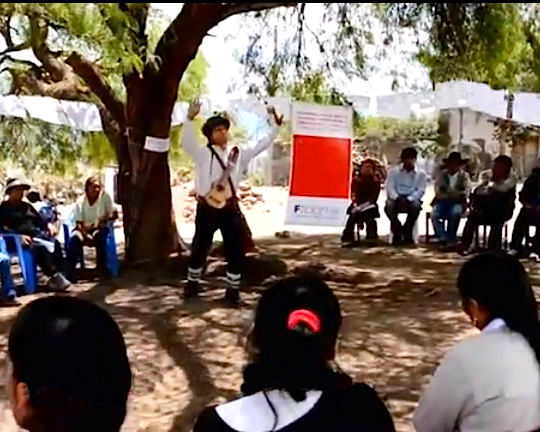

The value of words

Behind her beautiful smile, Clotilde had kept those terrible memories buried for too many years.
But one summer afternoon, with a cool breeze sweeping the mountains, the customary silence of her village of San Luis in the Peruvian Andes was broken by gentle music from the strings of a charango.
The friendly shade of an old tree drew Clotilde and her neighbors towards something very special. The shy steps of young women and the slow, serene approach of the village elders contrasted with the high energy of the children who charged upon the scene, full of curiosity about Raul, the musician at the center of the excitement.
Though Raul was dressed in the typical Andean attire of the area, no one had seen him before. Yet the beautiful, familiar songs in their native language were incentive enough for people to sit down to listen.
Sharing stories
"I'm here to share with you stories of my people and my community," started Raul, who gradually gained the trust of young and old. Soon they were singing along with him, joined in an intense moment of shared memories. Suddenly, everyone wanted to tell their stories, some singing, others narrating, while still others listened intently. Then Clotilde, the village leader, began to speak.
As her words poured forth, her mischievous smile faded, no longer able to hide the deep pain that she harbored inside. Clotilde had experienced first-hand the violence of the armed conflict that ripped apart Peruvian society starting in the 1980s; she had seen friends and relatives die at the hands of terrorists and she and her family were beaten and abused. Each of her words reflected the wounds she still holds in her heart.
That afternoon of exchanges and confessions was part of the MDG-F's work in Peru, an initiative to spark communal conversations, facilitate learning and improve nutrition in impoverished indigenous communities, where up to half of all children are chronically malnourished.
Forging bonds for better health
Oral storytelling preserves collective memory, strengthens a peoples’ identity and helps transmit cultural values and local knowledge. It builds self-esteem among the participants, who must overcome insecurities and fears to expand and strengthen their own expressive skills, memory, imagination and self-confidence; listeners, too, must learn to be attentive, to reflect, to remember.
Using the ability of oral tradition to forge a link between narrator and listener, the MDG initiative brings together indigenous families and health workers in relationships that will help convey values like the importance of good nutrition, hygiene and the pursuit of a healthy lifestyle.
The joint programme “Improving Nutrition and Food Security for the Peruvian Child: a Capacity Building Approach” is part of ongoing efforts by the MDG-Fund to combat inequalities around the world by helping governments to achieve the Millennium Development Goals (MDGs). Peru, where the MDG-Fund supports programmes in the areas of nutrition, private sector development, adaptation to climate change and youth employment, is one of the most unequal countries in Latin America.
Five agencies of the United Nations (UNICEF, WHO, UNODC, WFP and FAO) are collaborating on the programme, which has already benefited 4,661 families. It supports the Peruvian government's efforts to implement the national strategy “CRECER” and improve food security and nutrition in four of the country's poorest regions.